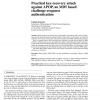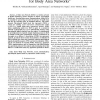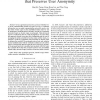211 search results - page 18 / 43 » Practical Authenticated Key Agreement Using Passwords |
118
click to vote
IJACT
2008
15 years 1 months ago
2008
Abstract: Hash functions are used in many cryptographic constructions under various assumptions, and the practical impact of collision attacks is often unclear. In this paper, we s...
125
click to vote
ICISS
2007
Springer
15 years 5 months ago
2007
Springer
Phishing attack is a kind of identity theft trying to steal confidential data. Existing approaches against phishing attacks cannot prevent real-time phishing attacks. This paper pr...
133
click to vote
JMM
2007
15 years 1 months ago
2007
Spontaneous interaction in wireless ad-hoc networks is often desirable not only between users or devices in direct contact, but also with devices that are accessible only via a wi...
152
Voted
TITB
2010
14 years 8 months ago
2010
A Body Area Network (BAN) is a wireless network of health monitoring sensors designed to deliver personalized health-care. Securing inter-sensor communications within BANs is essen...
126
click to vote
ICC
2009
IEEE
15 years 8 months ago
2009
IEEE
—A key agreement protocol is a protocol whereby two or more communicating parties can agree on a key or exchange information over an open communication network in such a way that...



